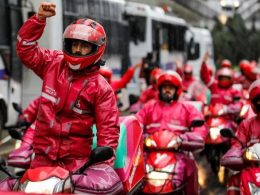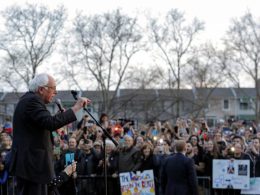A violent stand-off between protesters and riot police continues in Kiev, with unrest spreading to more than a dozen regional centres in other parts of Ukraine. Over the last week, crowds stormed and occupied administrative buildings in Lviv, Lutskthe and elsewhere in the west of the country. The protests have even spread to the east and south, which are traditionally Russian-speaking strongholds of President Viktor Yanukovich‘s Party of the Regions.
Alarmed by these developments, Yanukovich made new concessions to opposition political leaders on 28 January. He sacked his hard-line prime minister, Mykola Azarov, and the government. The president also promised to repeal draconian legislation criminalising protest and freedom of speech.
With the Yanukovich regime edging towards the brink and pro-government demonstrations taking place in Donetsk, the Crimea and other parts of the west and south – raising the spectre of a slide towards wider civil conflict – influential oligarchs publicly intervened as ‘brokers’ last weekend.
Ukraine’s richest man, Rinat Akmetov, released a statement on 27 January calling for an end to the “use of force” and for “peaceful action” to end the crisis. Akmetov and Yanukovich’s fortunes are closely linked, with Akmetov making his billions as Yanukovich rose to power. But according to the Guardian, quoting a Ukrainian political analyst, “The oligarchs keep good relations with the opposition as an insurance policy – it’s like investing in futures”. Dutifully, the opposition politician, Klitschko, welcomed Akmetov’s statement.
It remains to be seen if Yanukovich can make enough concessions to satisfy the opposition leaders, the protesters and the oligarchs or if Yanukovich is aiming to bring opposition figures into a new government.
Vitali Klitschko, the former world heavy weight boxer turned opposition leader, and another opposition politician, Arseniy Yatseniuk – linked to the Fatherland Party of former prime minister Yulia Timoshenko (currently in jail) – yesterday both rejected joining a cabinet. They said they would not abandon the protests until more demands were met.
Amongst protesters on Independence Square, in central Kiev, the main demand is for Yanukovich’s resignation and immediate elections. This is a fate Yanukovich is likely to strongly resist, not least as he will fear a new regime would orchestrate his jailing, as he is accussed of having done to Timoshenko.
At the same time, Yanukovich’s concessions were sharply criticised within his own party. “This will lead to additional de-stablisation in the country,” warned Oleg Tsariov, a leader of the ruling Party of the Regions.
Keen to push their advantage home, the opposition politicians, with the backing of the western powers, are demanding new elections and a new constitution. Their aims are not in the interests of working people in Ukraine. They want to see the creation of a new pro-western regime that will defend the interests of the super-rich, including by enforcing austerity policies on the mass of Ukrainians.
EU deal collapses
The protests began in November last year after Yanukovich rejected a free trade and political integration ‘association agreement’ with the EU, seen as a move to eventual Ukraine membership of the EU. Ukraine was facing bankruptcy, lumbered with a $15 billion debt. But the deal with the European Union, with IMF backing, would have entailed carrying out deep austerity cuts. With Ukraine already the poorest country in Europe, Yanukovich feared new austerity measures, including cuts to energy subsidies and social welfare, would lead to an explosion of workers’ protests. Instead Yanukovich forged a new deal with the Putin regime in Russia. President Putin offered $15 billion in loans and reduced energy prices.
Just like the western powers, the Putin regime is not acting in the interests of the working people of Ukraine. While warning the EU to stay out of Ukraine’s affairs during a meeting with EU leaders yesterday, the Russian president also stated that he expected to see Ukraine make “structural changes ” (i.e. austerity cuts) to ensure the $15 billion loan is paid back to Moscow.
The Yanukovich-Putin deal marked a setback for the US and EU, which want to increase their influence in Ukraine at Russia’s cost. This intensified the international power struggle for influence over Ukraine, which is an important geo-strategic territory. Two major gas pipelines run from Russia through Ukraine to Europe and the country also hosts Russian naval bases. Putin is now pushing for Ukraine to join a customs union it has made with Belarus and Kazakhstan, as a forerunner to a ‘Eurasian Union’. The Kremlin regards this as an important step to shoring up its regional position and to counter western imperialist influence.
The two months of mass protests saw many take to the streets of Kiev demanding an end to Yanukovich’s authoritarian rule and economic crisis. In the absence of a independent working class political leadership, many, especially in the west of Ukraine, desperately look towards EU membership as some sort of salvation, despite the economic and social misery the policies of the EU and IMF have brought upon Greece, Portugal and Spain and other countries. The brutality of the riot police, including the killing of at least five protesters in Kiev, last week, and video footage of police torture and humiliation of detained protesters, as well as the regime’s planned anti-protest legislation, only inflamed wider sections of the population.
Reactionary, pro-capitalist opposition leaders
Without an organised working class alternative, the street protests were from the start dominated by reactionary, pro-capitalist opposition figures, like Klitschko, with western backing. The protests have also seen significant influence from the far right, including neo-fascist groups. The anti-Semitic Svoboda party and the Right Sector were instrumental in orchestrating street rioting and the occupation of government buildings in Kiev and elsewhere.
Since the collapse of the former Soviet Union in 1991 and the emergence of an independent Ukraine, the working class of the country has paid heavily for its lack of political representation and independent organisations. The restoration of capitalism saw the plummeting of workers’ living standards, while a tiny minority looted state assets and becoming extremely enriched. Today a handful of oligarchs own the bulk of the Ukrainian economy.
The ‘Orange Revolution’ in 2004 saw an outpouring of mass anger at the authoritarian rule of Yanukovich and economic stagnation but the Kiev protest movement was safely kept along pro-Western capitalist lines by politicians like Timoshenko and Yuschenko. Yanukovich was forced from power but there was no real improvement in living standards or democratic rights under the subsequent rule of Yuschenko and Timoshenko. The resulting mass disillusionment allowed Yanukovich to return as president.
Politicians discredited
All these politicians are discredited in the eyes of most workers and youth. The same will happen with Klitschko and the other reactionary opposition leaders. Whatever the differences between the pro-EU opposition politicians and the Yanukovich regime, they are hostile to the interests of the working class and will ensure that working people are made to pay yet again for Ukraine’s deep economic crisis.
The most important lesson for working people from recent events, whatever their ethnic background, is the need to find their genuine political voice. A key task is to build independent unions and a mass united workers’ party in opposition to the Yanukovich regime, the reactionary opposition forces and also their international capitalist backers.
This means a struggle for democratic and for fundamental social and economic change. It means taking the lead in the fight for jobs, a living wage, decent housing and a fully-funded welfare, health and education system. It means the organised workers’ movement being in the vanguard of the struggle for lasting democratic rights and real social change, using the methods of class struggle, including mass mobilisations, strikes and general strikes, democratically organised by workers’ committees. A powerful workers’ movement could sweep away the far right and fascists from the streets and put forward a socialist alternative to those sections of society attracted by their poisonous ideas. Such a movement could also make a class appeal to the rank and file of the police, neutralising the force of the State.
Instead of the current Rada (parliament), which is stuffed full of reactionary, corrupt politicians controlled by oligarchs, an organised workers’ movement would demand the formation of a genuinely representative constituent assembly, and fight for a majority workers’ government. With socialist policies, a workers’ government would expropriate the enormous wealth of the parasitic oligarchs and take the main sectors of the economy into public ownership, to be democratically planned by working people for working people.












